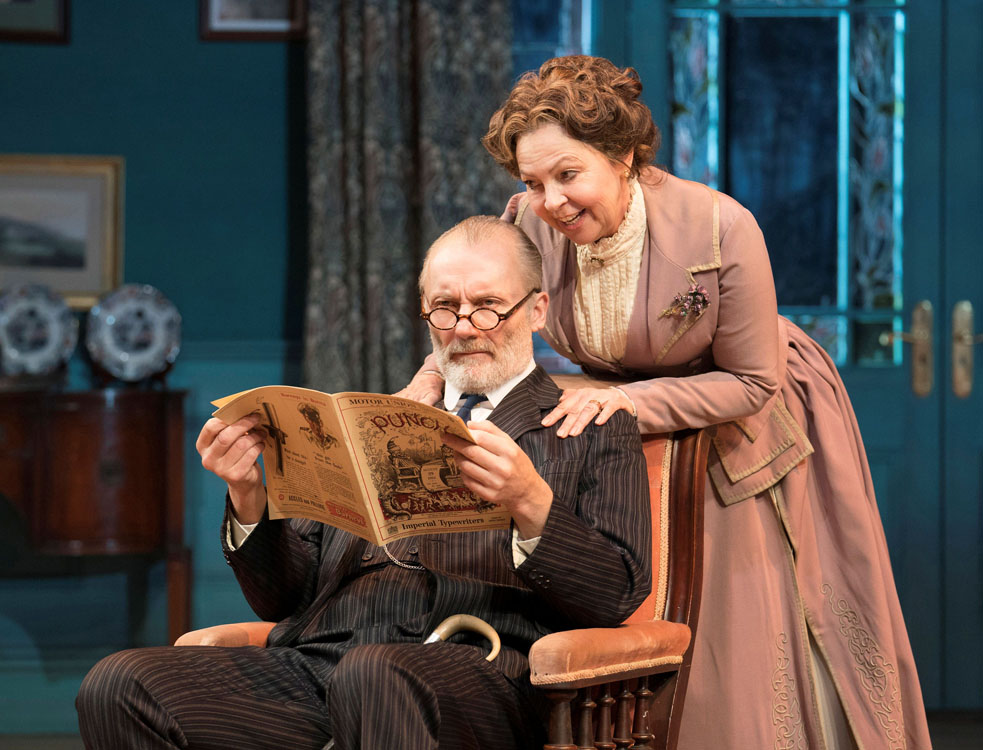
Following its successful première at the Chichester Festival last month, this lovingly crafted revival of Terence Rattigan’s retelling of the real-life story of George Archie-Shee, a 13-year-old naval cadet accused of stealing a postal order and his father’s fight to clear his name at any cost, is a must-see.
Under the direction of Olivier Award nominee Rachel Kavanaugh, this period-piece drama never loses its bite or wit thanks to an excellent cast, totally at home and in tune with Rattigan’s clever discourses on power, prestige and principle.
In the play, the Archie-Shee family is cast as the Winslows. Aden Gillett, as Arthur, provides the stern patriarchal pivot around which all else spins. Life is chugging along. Daughter Kate, a volunteer for the suffragette movement, is on the cusp of marriage. And while ne’er-do-well son Dickie is barely going through the motions at Oxford, younger son Ronnie is set up at the Royal Naval College, Osborne. Arthur’s wife Grace keeps the peace between them all, while parlourmaid Violet is kept on while the purse strings allow.
Edwardian Britain was not a time or place to lose face. When Arthur learns of his boy’s alleged misdemeanor and expulsion from naval college, he realises that only a complete exoneration can save the family’s good name and fortune. Once convinced of Ronnie’s innocence, he locks on to a high stakes end game that pits himself against the Admiralty and the Crown to defend his son from institutionalised injustice.
On a beautifully dressed stage representing the comfort of the family’s London living room, there is initial merriment to be had from the spats between feckless older son and father and a hilariously stilted interview between father and would be son-in-law, John, dwelling solely on the functional money matters of matrimony. “We’ll take the sentimental side of the project for granted.”
When the ‘hand grenade’ finally goes off and the family is plunged into crisis, Arthur employs the eminent barrister Sir Robert Morton, played with oodles of gravitas by Timothy Watson. We never witness the courtroom, but we learn of progress through members of the family who are attending the proceedings. With clever use of lighting and the use of gauze walls a projected image of a stone colonnade occasionally looms beyond the comfort of the living room.
As the drama unfolds, there is excellent work from Tessa Peake-Jones as Ronnie’s mum Grace, always hinged somewhere between being supportive or exasperated. Dorothea Myer-Bennett grows the role of daughter Kate from demure would-be fiancée to politically committed feminist with easy confidence, finally presenting as perfect foil and possible fatale to the battling Sir Robert. Gillett always effectively shows Arthur’s resolve while disintegrating, physically, through the strain of events. Misha Butler, in his debut stage role as the maligned juvenile Ronnie, is a convincingly scared lad, for the most part blissfully unaware of the upheavals going on around him.
Rattigan’s take on the ebb and flow of power and the motivations behind it retain a contemporary feel. Kate’s journey to suffrage and political voice is as every bit up to the minute as Francis McDormand’s recent Oscar-winning role in Three Billboards Outside Ebbing, Missouri. And Sir Robert’s determination to see the case to the end, at some considerable professional cost to himself, belies an emotional crack in his otherwise impeccable lawyer’s sangfroid. This Birmingham REP production is an Edwardian tale to savour. ★★★★★ Simon Bishop at Bath Theatre Royal on 6th March 2018

